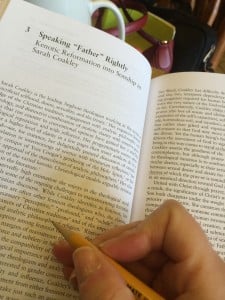 The following is an excerpt of my discussion of Linn Marie Tonstad’s new book, God and Difference, published in full over at FeminismandReligion.com last month.
The following is an excerpt of my discussion of Linn Marie Tonstad’s new book, God and Difference, published in full over at FeminismandReligion.com last month.
I still think that Valerie Saiving was right.
It’s been 56 years since she published her article on “The Human Situation” in The Journal of Religion, and her most basic groundbreaking insight holds true: Under patriarchy, the fundamental sin and danger for women is not too great a sense of self, too much pride as Reinhold Niebuhr would argue; rather, the problem is too small and diffuse a sense of self. Prioritizing others ahead of herself, the woman under patriarchy accepts second-class citizenship and submission to male headship as her rightful place.
Wrong.
Yet, in recent years, when reminding colleagues of this fundamental feminist insight from the second wave, I have received replies that begin “But Sarah Coakley says ….” What they lift up is Coakley’s supposed reclamation of kenosis as feminist, of self-emptying as a revolutionary Christian act in relationship to God. To them, this corrects Valerie Saiving. I have heard variations on this defense from senior male scholars who believe themselves to be quite advanced in their thinking, as well as from female scholars who believe this is the kind of feminist theology they want.
Wrong.
Fortunately, for her new book God and Difference: The Trinity, Sexuality, and the Transformation of Finitude, Linn Marie Tonstad read every word Sarah Coakley has written so you don’t have to. Tonstad expertly shows in chapter three what Coakley’s argument is, and how it fails to escape masculinist and patriarchal ideology. The book is an important new work in Christian systematic theology that successfully employs queer theory to reconstruct Trinitarian theology.
In the first paragraph, Tonstad states that trinitarian theology has become
“a way to enjoin practices of sacrifice and submission under the banner of countering the rapaciousness of modern subjectivity. The accompanying articulations of Trinitarian personhood reflect deeply gendered and misguided assumptions about human and divine personhood.” (p.1).
As the title of the book suggests, Tonstad is keenly interested in thinking about difference and how, if at all, the Christian concept of Trinity is usable as a way to see difference as inherent in deity itself. In short, gender gets in the way. More specifically, patriarchal social constructs of masculine and feminine so shade our understanding of difference that we are urged to break them open in order to get a richer, deeper, and more compelling understanding of God and difference.
To read the full review, click here.












